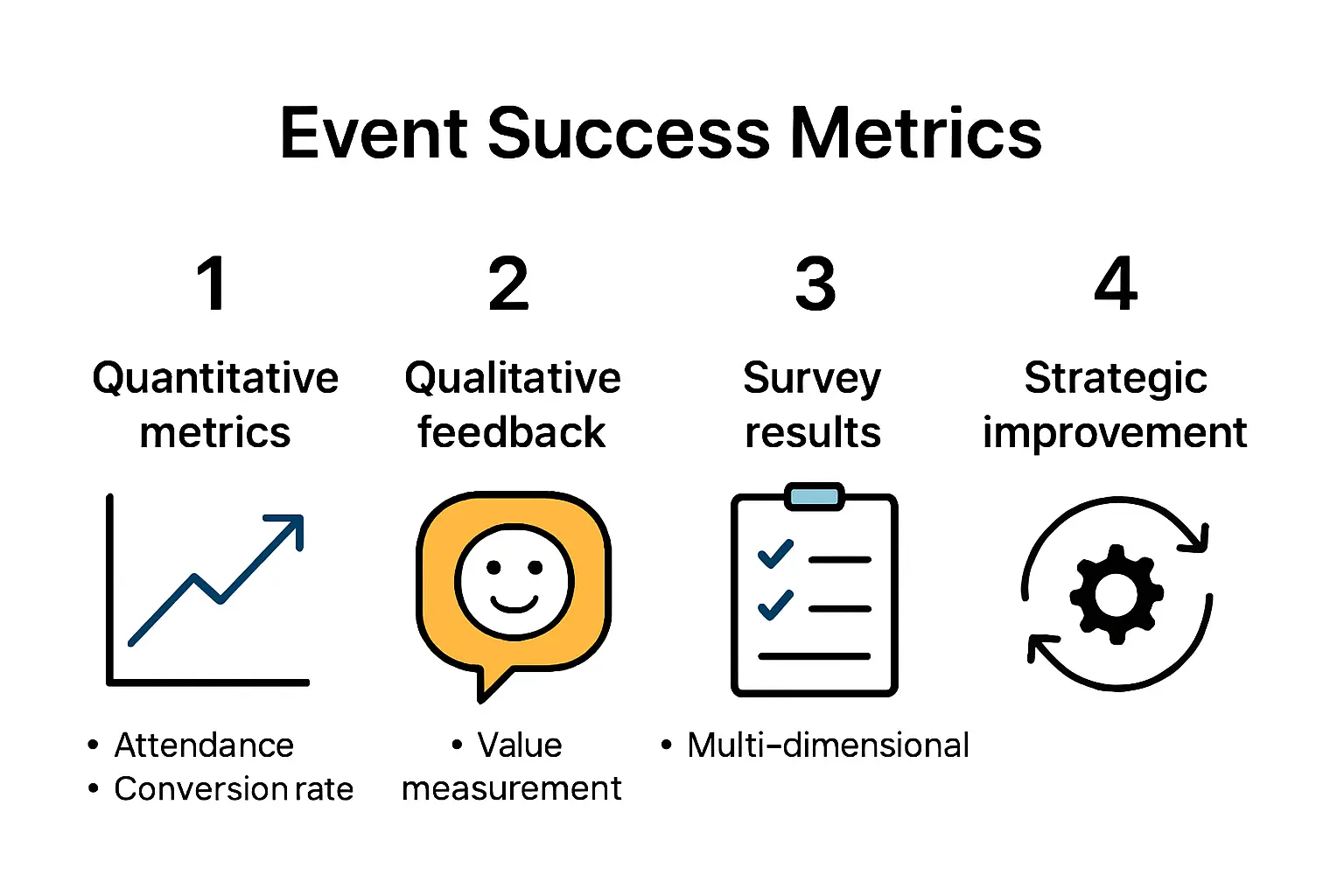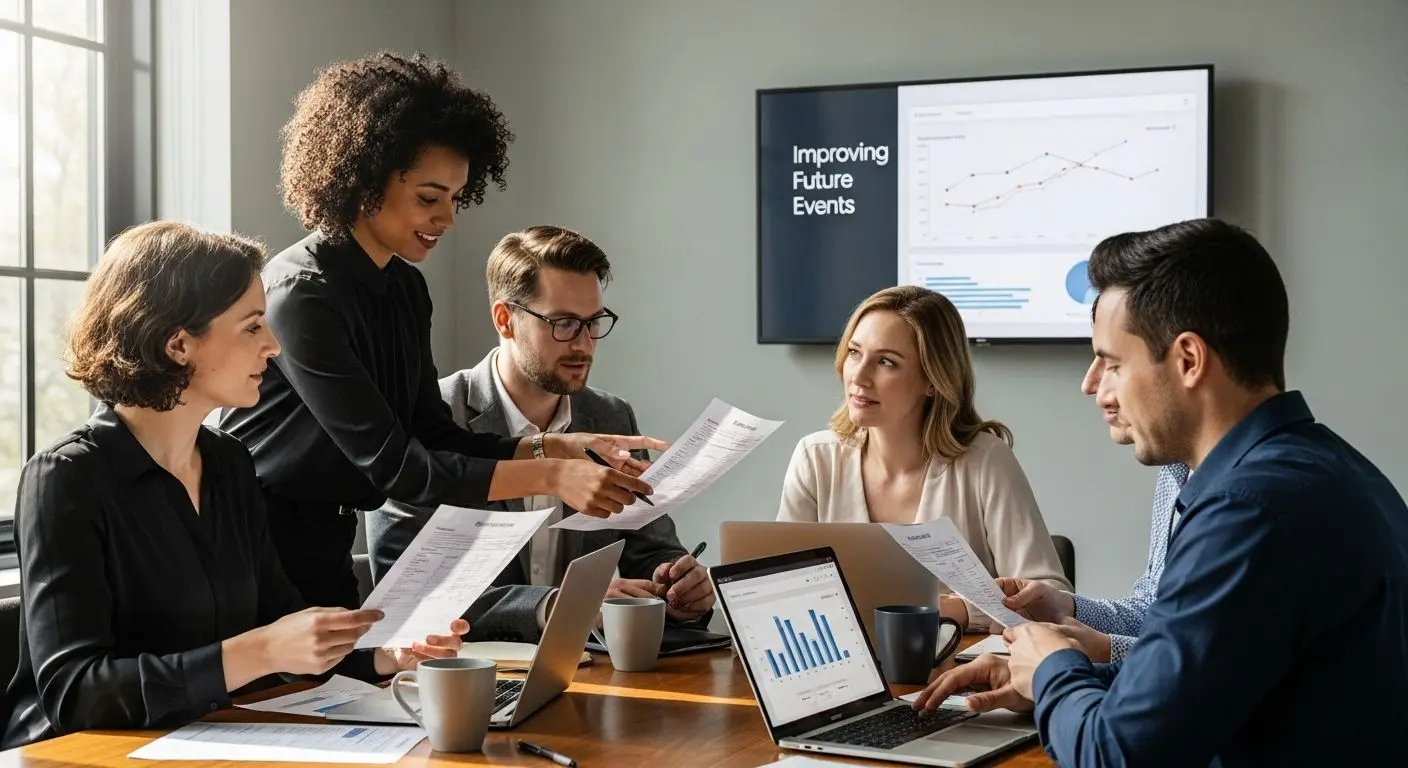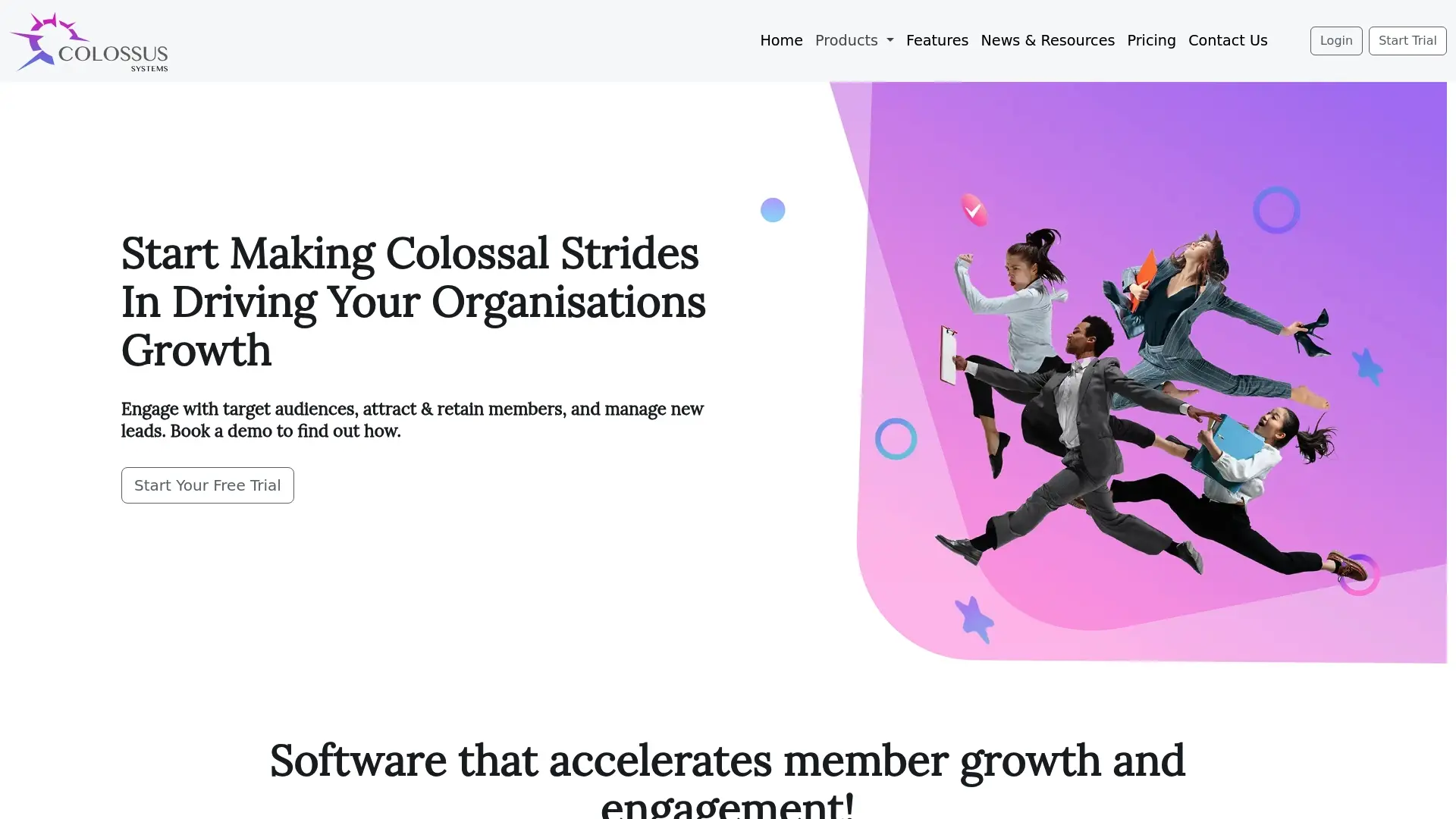Event Marketing Strategies for Membership Groups and Associations

Membership groups and associations thrive on the energy and connection that live events create. Did you know that around 45 percent of event ticket sales come straight from email marketing alone. Most assume that exciting event ideas or lavish venues win the day. Yet the real impact hinges on personal engagement, sharp audience insights, and clever use of feedback loops that turn one event into lasting momentum.
Table of Contents
- Understanding Your Audience For Successful Events
- Effective Promotion Channels For Event Marketing
- Engaging Attendees Before, During And After Events
- Measuring Success And Improving Future Events
Quick Summary
| Takeaway | Explanation |
|---|---|
| Understand your audience deeply | Knowing demographics and preferences fuels effective event planning and engagement. |
| Implement personalised marketing strategies | Tailor your messaging and channels based on segmented member data for better audience connection. |
| Engage attendees throughout the event lifecycle | Build anticipation before, interactive elements during, and community after to enhance member experience. |
| Collect comprehensive feedback consistently | Use structured surveys and assessments to gauge satisfaction and improve future events. |
| Continuously refine strategies based on data | Regularly analyse metrics and member feedback to make iterative improvements in event offerings. |
Understanding Your Audience for Successful Events
Successful event marketing strategies hinge on one fundamental principle: knowing your audience intimately. Membership groups and associations cannot create impactful events without deeply understanding their members’ motivations, preferences, and engagement patterns.
Demographic and Behavioural Insights
Understanding your audience begins with comprehensive data collection and analysis. The American Society of Association Executives recommends conducting a thorough event marketing audit to gather critical demographic information. This process involves examining past event attendance, tracking member interaction patterns, and collecting detailed feedback.
Key demographic factors to analyse include age range, professional background, career stage, geographical location, and specific industry interests. By mapping these characteristics, organisations can create targeted event experiences that resonate with specific member segments. For instance, younger professionals might prefer interactive digital workshops, while senior executives may value networking-focused conferences.
Personalisation and Engagement Strategies
Modern event marketing demands personalisation beyond generic approaches. Event Marketing Institute suggests developing segmented communication strategies that speak directly to different member groups. This means crafting tailored messaging, selecting appropriate communication channels, and designing event formats that match each segment’s preferences.
Effective personalisation involves using data analytics to understand member behaviour. Track metrics such as previous event attendance, session preferences, engagement with digital content, and professional development interests. These insights enable organisations to create highly targeted event marketing campaigns that feel individually curated.
Continuous Feedback and Adaptation
Audience understanding is not a one-time exercise but an ongoing process of listening and adapting. Implement robust feedback mechanisms such as post-event surveys, focus groups, and digital engagement tracking. These tools provide real-time insights into member satisfaction, emerging interests, and potential areas of improvement.
Successful membership groups treat audience understanding as a dynamic, iterative process. By continuously refining their knowledge of member needs, organisations can create event marketing strategies that not only attract attendees but also foster long-term engagement and loyalty.
Remember, in the realm of event marketing, knowledge is not just power—it is the foundation of meaningful member experiences.
Effective Promotion Channels for Event Marketing
Event marketing success depends on strategic communication across multiple channels. Membership groups must carefully select and integrate promotional platforms that effectively reach and engage their target audience.
Digital Marketing Channels
The Event Management Institute emphasizes the importance of a multi-channel approach to event promotion. Digital platforms offer unprecedented opportunities for targeted outreach and engagement. Social media platforms like LinkedIn, Twitter, and Facebook provide precise audience targeting capabilities, allowing organisations to reach specific professional segments with tailored event messaging.
Email marketing remains a powerful tool for direct communication. Segmented email campaigns can deliver personalised event invitations and detailed information directly to members’ inboxes. Professional newsletters, member databases, and strategic email lists enable organisations to communicate event details efficiently and track engagement metrics.
Traditional and Personal Communication Channels
The American Library Association highlights the continued relevance of traditional promotion methods. Personal contact and direct marketing techniques remain crucial for building genuine connections. Professional networking events, industry conferences, and member meetings provide opportunities for face-to-face event promotion.
Print materials such as brochures, postcards, and professional publications can complement digital strategies. Local media outlets, industry publications, and professional association newsletters offer additional platforms for event visibility. These channels are particularly effective for reaching members who prefer traditional communication methods.
To better understand the different event promotion channels available to membership groups and associations, the following table summarises the key digital and traditional methods mentioned in the article, along with their purposes and typical effectiveness.
| Channel Type | Examples & Platforms | Purpose/Use | Effectiveness/Notes |
|---|---|---|---|
| Digital Marketing | LinkedIn, Twitter, Facebook, Email campaigns, Newsletters | Targeted outreach, personalisation, efficient updates | Highly effective for young/professional segments; enables tracking |
| Traditional & Personal | Networking events, Meetings, Brochures, Postcards, Print publications | Build personal connections, reach wider demographics | Valuable for senior/existing members or those preferring traditional media |
| Integrated Strategies | Combined digital & traditional approaches, Consistent messaging | Cohesive member experience, maximise reach | Ensures message is reinforced; supports diverse audience |
Integrated Communication Strategies
Successful event marketing requires a cohesive, integrated communication approach. Organisations must ensure consistent messaging across all channels, creating a unified narrative that resonates with their membership. This involves developing a comprehensive communication plan that synchronises digital and traditional promotional methods.
Tracking and analysing promotional channel performance is essential. Use analytics tools to measure engagement rates, click-throughs, and conversion metrics. This data enables continuous refinement of promotional strategies, ensuring maximum reach and effectiveness.
The most successful event marketing strategies are those that combine technological sophistication with genuine, personalised communication. By understanding their audience and selecting the right mix of promotional channels, membership groups can create compelling event experiences that drive engagement and participation.
Engaging Attendees Before, During and After Events
Effective event engagement requires a comprehensive strategy that maintains member interest and interaction throughout the entire event lifecycle. Membership organisations must develop strategic approaches that create continuous communication and meaningful experiences.
Pre-Event Engagement Strategies
ACC Liverpool highlights the critical role of anticipation building before an event. Email marketing serves as a powerful tool, with approximately 45% of event ticket sales directly attributed to strategic email campaigns. These communications should progressively reveal event details, creating excitement and curiosity.
Begin with teaser emails that provide glimpses of the event’s value proposition. Include testimonials from previous participants, speaker highlights, and exclusive content that demonstrates the event’s unique offerings. Interactive pre-event surveys can also help members feel involved and provide valuable insights into their expectations.
Real-Time Event Interaction
Eventbrite emphasizes the importance of maintaining active engagement during the event itself. Social media platforms offer powerful tools for real-time interaction. Implement a dedicated event hashtag that encourages attendees to share their experiences, participate in live discussions, and contribute to the collective event narrative.
Consider incorporating interactive elements such as live polling, Q&A sessions, and digital networking opportunities. These strategies transform passive attendance into active participation, creating more memorable and valuable experiences for members. Digital platforms can facilitate immediate feedback, allowing organisers to adjust session dynamics in real-time based on attendee responses.
Post-Event Community Building
Engagement should not conclude when the event ends. ACC Liverpool recommends sending prompt post-event communications that maintain momentum and reinforce the event’s value. Share resources like presentation recordings, key insights, and follow-up materials within days of the event’s conclusion.
Create opportunities for continued interaction through online forums, follow-up webinars, or exclusive member content that extends the event’s learning experience. This approach ensures that the event becomes more than a singular moment—it becomes part of an ongoing conversation and community-building process.
Successful event engagement is a holistic journey. By developing strategies that connect with members before, during, and after the event, membership organisations can transform traditional events into dynamic, interactive experiences that foster lasting connections and sustained member interest.
The following table outlines strategic engagement approaches membership groups should employ before, during, and after events, together with representative tactics as described in the article.
| Event Stage | Engagement Strategies/Tactics | Purpose |
|---|---|---|
| Pre-Event | Teaser emails, Testimonials, Speaker highlights, Pre-event surveys | Build anticipation and gather expectations |
| During Event | Event hashtag, Live polling, Q&A sessions, Digital networking | Encourage real-time interaction and participation |
| Post-Event | Follow-up emails, Resource sharing, Online forums, Webinars | Maintain momentum and foster ongoing community |
Measuring Success and Improving Future Events
Effective event marketing strategies require robust measurement frameworks that go beyond superficial metrics. Membership organisations must develop comprehensive evaluation approaches that provide meaningful insights into event performance and member engagement.
Key Performance Metrics
Raybourn Group International emphasizes the importance of defining success metrics aligned with organisational mission and vision. Quantitative metrics should include attendance rates, registration conversion percentages, revenue generated, and member satisfaction scores. These numerical indicators provide a baseline understanding of event performance.

However, successful measurement extends beyond simple numerical tracking. Organisations must also capture qualitative data such as attendee feedback, learning outcomes, networking effectiveness, and perceived value. This multifaceted approach enables a more nuanced understanding of event impact and member experience.
Comprehensive Feedback Collection
Cvent recommends implementing structured feedback mechanisms through surveys, focus groups, and interactive post-event assessments. These tools should capture detailed insights about different event aspects, including content quality, speaker effectiveness, logistical arrangements, and overall member satisfaction.
Advanced feedback collection involves creating multi-dimensional evaluation frameworks. This means designing questions that not only measure satisfaction but also explore deeper engagement indicators. For instance, assess how events contribute to professional development, networking opportunities, and members’ organisational objectives.
Strategic Improvement Planning
The American Society of Association Executives highlights the significance of transforming collected data into actionable improvement strategies. This involves conducting thorough event marketing audits that analyse attendee demographics, engagement patterns, and emerging member preferences.
Successful organisations view each event as a learning opportunity. By systematically reviewing performance data, they can iteratively refine event formats, content strategies, and member engagement approaches. This might involve adjusting session designs, incorporating new technologies, or redesigning membership tiers to better align with member expectations.
Continuous improvement is the hallmark of exceptional event marketing. Membership groups that invest in rigorous measurement and strategic adaptation create dynamic, responsive event experiences that consistently deliver value to their members. The goal is not just to host events, but to create transformative experiences that drive professional growth and organisational engagement.

Frequently Asked Questions
What are effective event marketing strategies for membership groups and associations?
Effective event marketing strategies include understanding your audience, implementing personalised marketing, engaging attendees throughout the event lifecycle, and consistently collecting feedback to improve future events.
How can I understand my audience better for event planning?
Understanding your audience can be achieved through demographic and behavioural insights, by analysing past event attendance, tracking interaction patterns, and collecting detailed member feedback to tailor event experiences effectively.
What are the key channels for promoting events to members?
Key channels for promoting events include digital marketing platforms like social media and email, as well as traditional methods such as print materials and face-to-face networking. An integrated approach ensures consistent messaging.
How can I measure the success of my events?
Success can be measured through key performance metrics such as attendance rates, registration conversions, and member satisfaction scores, along with qualitative feedback on the event experience. Regularly reviewing this data allows for continuous improvement.
Elevate Your Event Marketing with Colossus Systems
Are you struggling to truly understand your members or finding it difficult to transform event engagement into ongoing loyalty and growth? The article on event marketing strategies highlights vital pain points like the challenge of personalised communication, creating sustained engagement before and after events, and the need for actionable feedback to deliver real value to members. These issues can hold your association back from achieving its full potential.

Take your event marketing to a new level. With Colossus Systems, you can unify event planning, rich member data, analytics and targeted communications within one platform. Streamline event registration, build dynamic feedback loops, and engage every segment of your audience more effectively. Ready to transform your events into powerful drivers of growth? Visit our engagement and management solutions today and discover how you can create lasting member experiences that set your organisation apart.